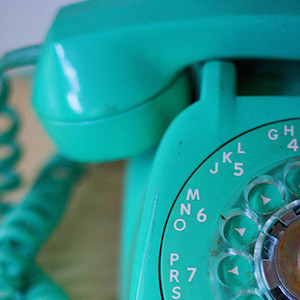Miss Eleanor

Forgive me, Ma’am, I don’t know your name. You could be a Mildred or a Delores, a Mary or a Faye, but I’ve taken to calling you Eleanor, since I believe it suits you. I don’t know if this is true, but to me it has become so.
I have no idea what you look like—you could look like anybody, I suppose—but I know that your voice is old and slurred, and confused and disordered. This I know because for all the forty-some-odd times you’ve “wrong number” called me over the past five years, I still know almost nothing about you. And you know next to nothing about me.
I do know that you are from New Jersey, or at least your phone number is, like mine, though I haven’t lived there for more than ten years. Your accent speaks of the South, but I think you must live in the North, as evidenced by the time you called to warn me about the snow—when it was sunny and 70 degrees here in Charlotte.
In a way, we’re opposites—old and young, North and South. But maybe we’re alike. I’m not sure, really, but I do know that you’re lonely and I know that I used to be, too.
You call me about once every other month—when you don’t, I start to worry—and you always call me “Dana.” Dana—I love ya, darlin’. Tell Mommy I say “helloooo.” I was just thinking ‘bout cha. Haven’t spoken to you in awhile. Call me back. Love ya. Bye bye.
As I’ve tried to tell you before, I’m not sure who Dana is. I figure she could be your granddaughter, your niece, or maybe even your great granddaughter or great niece, but I know to you she’s just, “Dahh-lin’.”
I’ve tried to picture you, Miss Eleanor. I’ve tried to see your face and imagine it weathered and tired and sunken, but spirited. Your hair may be grey, may be white, or maybe it’s red—or dyed some spectacular color. Perhaps Dana dyes it for you. Maybe Dana’s a hairdresser. Or maybe she’s an engineer, or a homemaker, or a banker, or a chef. Or a writer. I don’t know who Dana is, Ma’am, but I do know that she is not me. You don’t seem to understand this, though.
For five years I’ve listened to your voice—through voicemails or the occasional call that I actually do answer—listened as its toothless, sluggish, broken speech changed from mumbled to unintelligible to incoherent, all save “Darlin’,” “Love ya,” and “Dana.” You’ve changed, Ma’am. You’ve grown older, sicker, more confused. But then, I suppose we all do.
Your calls used to frustrate me. They frustrated me so much so that, I’m sorry, I nearly blocked them. I was reckless then—bordering on wrecked—as I did my damnedest to get happy and live the life I’d planned. This was back when I believed I could control these things. This was back when I believed that happiness was a lack of misery. This was back when I believed that good enough was actually good enough. This was back when I still loved him. It was way back when I still thought that he was the one and that we could—somehow, maybe, hopefully—make ourselves fit. A time when disruptive calls from delirious strangers were just one more stupid thing to worry about. “Daaaana?”
I’m sorry that I found you an inconvenience.
As your voice grew weaker, more weary, more delicate, so did my patience. Not with you, but with him. My capacity to love grew tremendously—he stretched it and tied it in knots, never breaking—but my capacity to wait for love’s return, six, seven, eight, nine years . . . shrank up until I couldn’t even find it any more.
Through all that mess your calls—your strange little calls—remained a constant. Even my friends knew about you. “Oh, it’s Miss Eleanor, again,” I’d say, first with bewilderment, then with amusement, then with contentment as you, Ma’am, gradually became a friend, too.
He knew about you.
“Was that the weird old lady again?” he’d smirk.
I’d sigh, “Yeah. I think she’s confused. Lonely.”
“That’s sad . . . but you should really just block her.”
“I don’t mind her. She’s looking for somebody . . . I feel for her.”
So it continued. “Dana?” “No, Ma’am, this is not Dana. You have the wrong number.” “Dana?” “No, I’m sorry, I don’t know where Dana is.” “Is that you, Dana?” “No. I don’t know who Dana is.” “Is that you, honey?” “No. I’m sorry.” I tried it all, but you were persistent.
You grew sicker, more demented, and I, we (him and I), grew weaker, more tired, stranger, more distant. His voice—once loving—turned discordant, dissonant, and then dismissive. It began to frustrate, annoy, and enrage me, until I didn’t know him anymore. His face, yes. His manner, of course. But I didn’t know who—just who in the hell—he was anymore.
But you—yes you, Miss Eleanor, Miss Faye, Miss Delores Mary Margaret Mildred—you were that strange but constant voice. That voice that let me know I was needed, if only every once in awhile. If only because you had no one else. If only by mistake.
It occurred to me once that maybe you knew I was not her. Maybe you knew but didn’t want to know. Or didn’t care. Maybe you just needed me—or needed my voice. Like I needed a kind stranger when my life was tumbling . . . shrinking . . . deflating. You called me the day we ended. The day I walked through the door, heard the silence, climbed the stairs, and saw his miserable feet and frayed jeans. He wore the shoes that I’d bought him. And I knew. I knew that shoes indoors meant that he was walking out, that he was leaving, that we were finally through. The day that I cried and peeled Brussels sprouts until my eyelids and fingers were red and swollen. The strewn leaves from the sprouts clogged the drain. They broke the disposal. I plunged the sink until it ran over, staining my clothes with the remnants of too much of a bland and bitter thing.
And you called to tell me that you loved me. And I believed you.
You see, Ma’am, I used to buy apples. I’d buy them by the bag full even though he didn’t like them. He hated fruit—yes, all fruit—and he refused to touch it, even when it was sitting right in front of him, ripe and sweet. I bought the apples for me.
But I didn’t eat them.
Eating apples by yourself is even sadder than watching them rot.
The morning after he left, I emptied the fridge. Tossed out everything that smelled like him. Everything that tasted like our life together. Poured barbeque sauce and salsa down the drain. Pitched Brussels sprouts and beans—tossed Spanish chicken and Texas Pete.
I left the fruit.
You didn’t call me again until the day that I met the right him. You left a voicemail saying that you were ok, that a man from upstairs had lowered your bed for you, that I should tell “Mommy” hello. And that you loved me. And I believed you.
I didn’t know what else to believe that day. Nobody can predict love. But I wanted to believe that I could be loved the way that I had loved. I wanted to believe that my heart was not broken and that it still, very much, could pulse. I wanted to believe that strangers on the phone could love one another the way that they each so desperately needed to be loved. Was it coincidence that I’d so quickly fall in love with a man who was a voice before a face, who was practically still a stranger, and who scarcely knew me? “Silly girl,” he’d call me. Maybe he knew me better than I thought.
You called the day after John first told me he loved me. “No, Ma’am, Dana’s not here. No, Ma’am, I’m not Dana. No, I’m sorry. No, I . . . You have a good day, Ma’am.”
I told John that I loved him. And then again. And then again. Unknotting myself until I was awake and breathing. I’m not sure, but I believe it was—joy. I didn’t know what to call it. But I knew I was done looking. I knew I could believe in something again.
Later, after the tension left my chest, after I could look at Brussels sprouts without crying, after I stopped caring so much and just started living, after I fell in love without trying . . . we, he and I, ate apples. He cut them into little smiles and we ate them as we watched the snow blanket our Charlotte home. You called that day. It was snowing in New Jersey, too.
I don’t know why I said it.
“Yes, Ma’am,” I answered. “Yes, this is Dana. Yes, Ma’am. I love you, too.”
Read The Story Behind “Miss Eleanor” on our blog.










